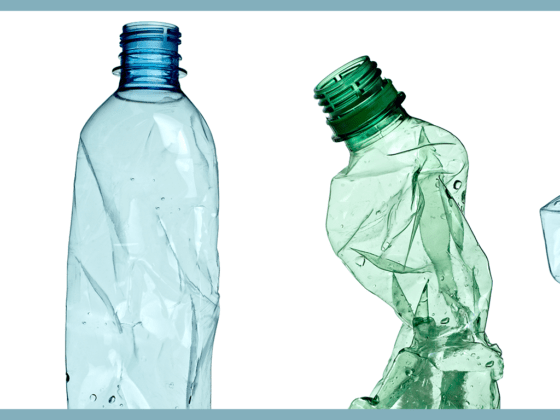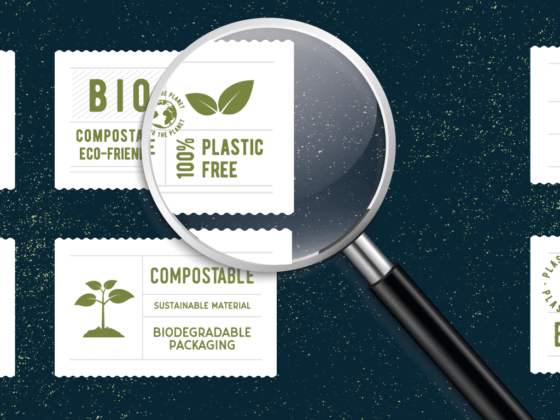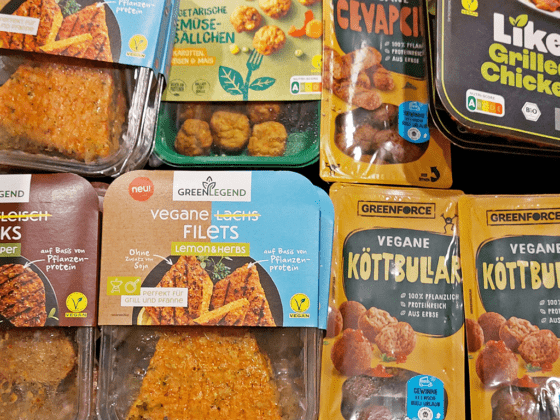SUMMARY
For flustix on site at the fair: Xenia Kersten, Malte Biss and Krzysztof Babel.
The Fachpack is the most important trade fair for the packaging industry in Europe. The flustix team was on site, looked around for three days, and now draws a conclusion: The color green dominates, the transformation of the industry is noticeable – but the really big innovations were missing.
How innovative is the packaging industry?
The industry is under pressure. Online trade is on the rise, the demands on the sustainability of packaging are increasing, and so are raw material prices. The solutions presented at the trade show appear rather unspectacular: fiber-based materials are on the rise. Cardboard, paper, cardboard packaging, but also materials made of grass, straw, and bamboo characterize the outward appearance of Fachpack. The actual numbers speak a different language: around 75 percent of the packaging used is still plastic-based. One reason why plastic remains on course even in times of sustainability storms: The raw material is still relatively cheap – despite the crisis.
Cardboard, paper and cardboard are on the rise
Still, the renaissance of the paper industry is noticeable and visible. There is a spirit of optimism. The sector’s advantage is clear: recycling and closed-loop structures for paper are much better developed than those for plastics. In addition, paper giant Mondi and other suppliers are making inroads into the plastics market with an innovation: Several producers presented a new impact-resistant paper at Fachpack. The stuff could replace stretch film in the future – whether as cling film around break bread or for the safety of moving goods or goods on pallets. A huge field of application.
Plastic producers advertise recyclability
It also looked very green, at least in terms of color, among producers of plastic goods. On closer inspection, big innovations were missing. Those who had no news to offer in the area of sustainability focused primarily on the topic of recyclability. Sounds good, but we at flustix always point it out: You have to look at this thing holistically. A material may be recyclable, but if there is no infrastructure for it, no return options, then all this is of no use. Besides, the conditions in Europe are completely different: While we are making good progress here in Germany, other countries like Portugal are still at the very beginning. There, practically everything made of plastic ends up being incinerated. However, the quotas in Germany are too low, too. What are the reasons for this? Read about it here.
Many are not yet aware of new EU directive
We were surprised to find that many companies are not yet prepared for the new EU Consumer Protection Regulation or were not even aware of it. The regulation is intended to protect consumers from being misled in the future: Frequently used marketing slogans such as “plastic-free” or “recyclable” will then have to be proven by independent third parties. Xenia Kersten, Head of Communications at flustix says: “It is important to prepare for it: both production and marketing must be adapted. If slogans are to be used further, proof can already be obtained in the form of independent certification.” We’ve reported on this several times. What exactly happens, you read here.
Misleading slogans also pop up around paper
The lack of independent certification is not only an issue with plastic products. Many fiber-based packages with slogans like “plastic-free” were on display at Fachpack, too. Of course, as a seal specialist, we always immediately ask about independent certification (“Hello, we’re the ones with the fish!”). Guess what… As a rule, there is no such thing. And on closer inspection, some products were not quite plastic-free after all.
Another insight: recyclates are too expensive
Most importantly, the industry is by no means hostile to innovation. It is struggling with raw material shortages, rising prices and has to manage the huge demand triggered by the Corona pandemic. Moreover, prices for recycled plastic are far too high, which is slowing down the transformation. So what does the future hold? Manufacturer Mondi brings it to the point with its well-known slogan: “Paper Where Possible, Plastic When Useful.”
For consumers, one question remains above all: Which packaging is the sustainability winner in the supermarket? You can read everything about it here.
 English
English Deutsch
Deutsch




